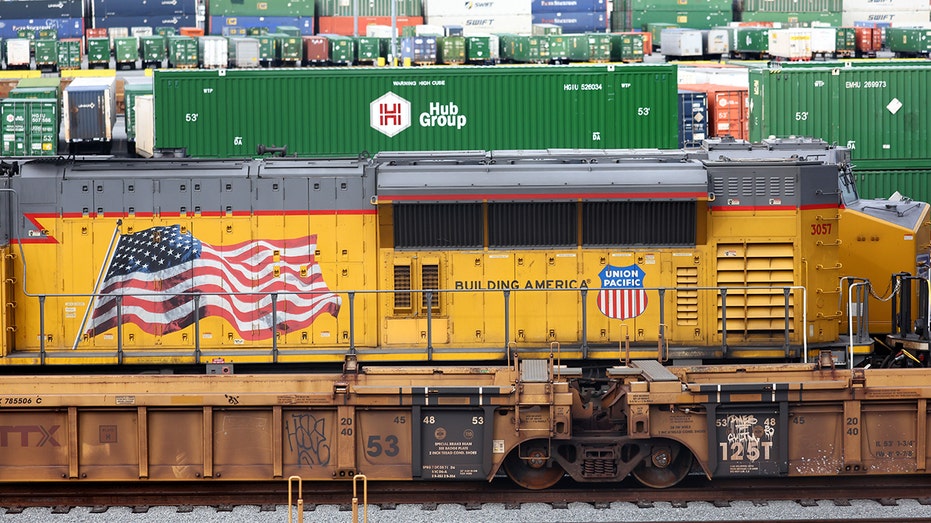Rail union strike would create a ‘crippling’ economy, industry official warns
Association of American Railroads CEO says Congress may need to ‘step in’
US railroads doing 'everything we can' to prevent economic 'crippling' from strike: Ian Jeffries
Association of American Railroads President and CEO Ian Jeffries says the companies are 'ready, willing and able' to negotiate new terms with rail unions.
After a fourth U.S. railroad union rejected an agreement with their employers brokered by the Biden administration - and reignited fears of a nationwide rail worker strike - one spokesman for the rail companies claimed they’re "ready, willing and able" to reach new negotiations.
"We need to keep the network moving. We need to keep the economy moving," Association of American Railroads (AAR) President and CEO Ian Jeffries said on "Varney & Co." Tuesday. "And so that's why we stand ready, willing and able to reach new voluntary agreements. And absent that, we believe Congress might need to be ready to step in as it historically has."
Jeffries’ comments come just after a fourth rail union rejected a tentative agreement with the nation's major freight railroads, raising the prospects of a nationwide strike that could kneecap the economy in the middle of the holiday season.
Members of the Transportation Division of the International Association of Sheet Metal, Air, Rail, and Transportation Workers (SMART-TD), representing more than 28,000 workers, issued a split decision in the vote count announced Monday. Yardmasters represented by SMART-TD voted to ratify their contract, but a smaller group of some 1,300 train and engine service members voted against their separate contract.
ANOTHER RAIL UNION REJECTS DEAL, ESCALATING STRIKE THREAT AHEAD OF HOLIDAYS
All 12 unions involved in negotiations must ratify their new agreements to avert a potential work stoppage, which would decimate already fragile supply chains in the middle of the Christmas shopping rush. While eight have already agreed to the deal negotiated by the Presidential Emergency Board (PEB) appointed by President Biden, a strike could happen as early as Dec. 9.

Railroad companies are "ready, willing and able" to reach new rail union agreements, Association of American Railroads President and CEO Ian Jeffries said on "Varney & Co." Tuesday, November 22, 2022. (Getty Images)
In October, the AAR had estimated that the strikes’ disruption to the supply chain would cost the U.S. economy $2 billion per day.
"That's exactly why we need to do everything we can to avoid an economic crippling, work stoppage that's in no one's interest whatsoever," Jeffries said Tuesday. "Not our employees' interests, not the carriers' interests, not our customers' interests."
While the original agreement gave rail workers a 24% wage increase during a five-year period and thousands of dollars in bonuses, some unions have voiced concerns about the lack of sick time off.
"The [National Carriers' Conference Committee] stated we have sick benefits, that is true. But to start claiming the benefits, you need to be off 7 days – 7 days without pay," a Brotherhood of Maintenance of Way Employees Division of the International Brotherhood of Teamsters member previously told FOX Business.
He recalled one worker who took off 10 days because he had COVID-19 and was paid only $74 over that time. Many workers have to use vacation time in order to get paid for such absences, he said, and that it is a sacrifice in their career field.
Railroad strike will be 'bad for America': Rep. Troy Nehls
Rep. Troy Nehls, R-Texas, discusses Biden's handling of high gas prices, how Americans will be affected by the rail strike, growing recession fears and the ongoing border crisis.
"Most guys spend over 230 days away from their families a year, so our vacation is very important," the worker said. "My grandfather died, and instead of being with my family, I had to work and use vacation for his funeral. We do not get hardly any time whatsoever. Or you have guys come in sick with COVID because they don't want to lose a paycheck."
Jeffries noted that rail companies are continuing to have discussions to identify paths forward with the four unions that have rejected the tentative deal.
"Our employees work 24/7, 365 [days] and do an amazing job moving America's freight and doing it safely. These are tough jobs, and that's why they're so highly compensated and they absolutely deserve the compensation that is included in these agreements," Jeffries said. "And that's why it's important we get the last few across the finish line so that our employees can get the compensation they've earned and they deserve for the hard work they do."
GET FOX BUSINESS ON THE GO BY CLICKING HERE
Earlier this month, U.S. Labor Secretary Marty Walsh told FOX Business’ Edward Lawrence that he’s encouraged both sides to stay at the table, and expressed hopes there won’t be a strike.
"I've encouraged both sides to stay at the table and get another try and get another ratification vote out there, before the deadline happens," Walsh said, adding that he’s "very engaged" in the ongoing talks which he previously described as "long" and "painful."
Railroad companies 'disappointed' some unions rejected initial deal: Ian Jeffries
Association of American Railroads president and CEO Ian Jeffries says 6 out of 12 unions have agreed to the railroad worker contract negotiations.
Jeffries suggested all parties take a step back and evaluate where negotiations are right now.
"We've had 8 of 12 unions, 9 of 13 contracts fully ratified, which means those employees and those unions are getting that immediate $16,000 pay raise and 24% over the terms of the contract, which will result in an average $160,000 wages and benefits for our employees," Jeffries explained.
"So we're very pleased we've gotten this far. We do have some work to do with our final four unions, and we continue to have those discussions and identify a path forward."
FOX Business’ Breck Dumas contributed to this report.























